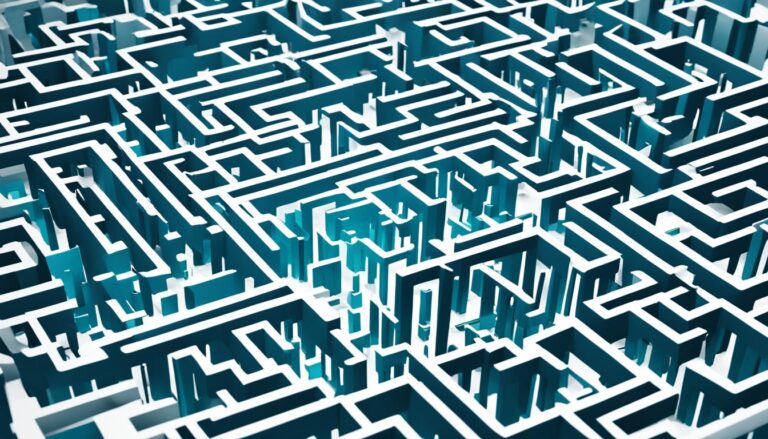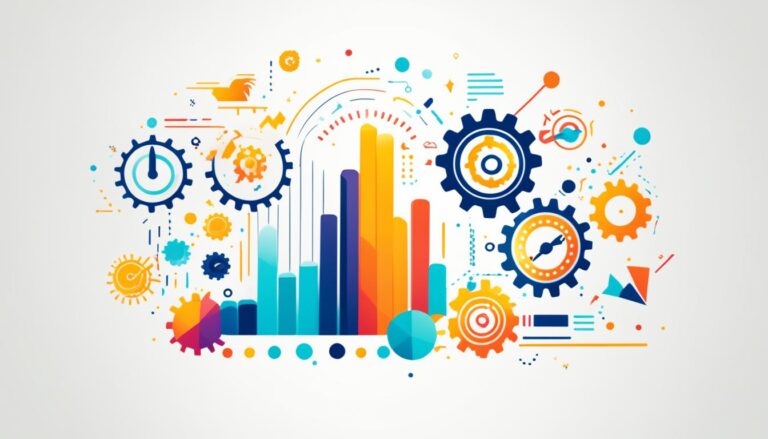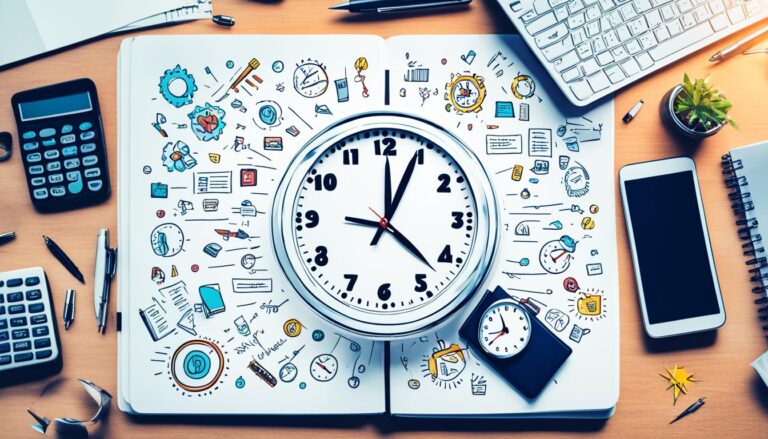Maximize Your Efficiency: Best Books for Productivity
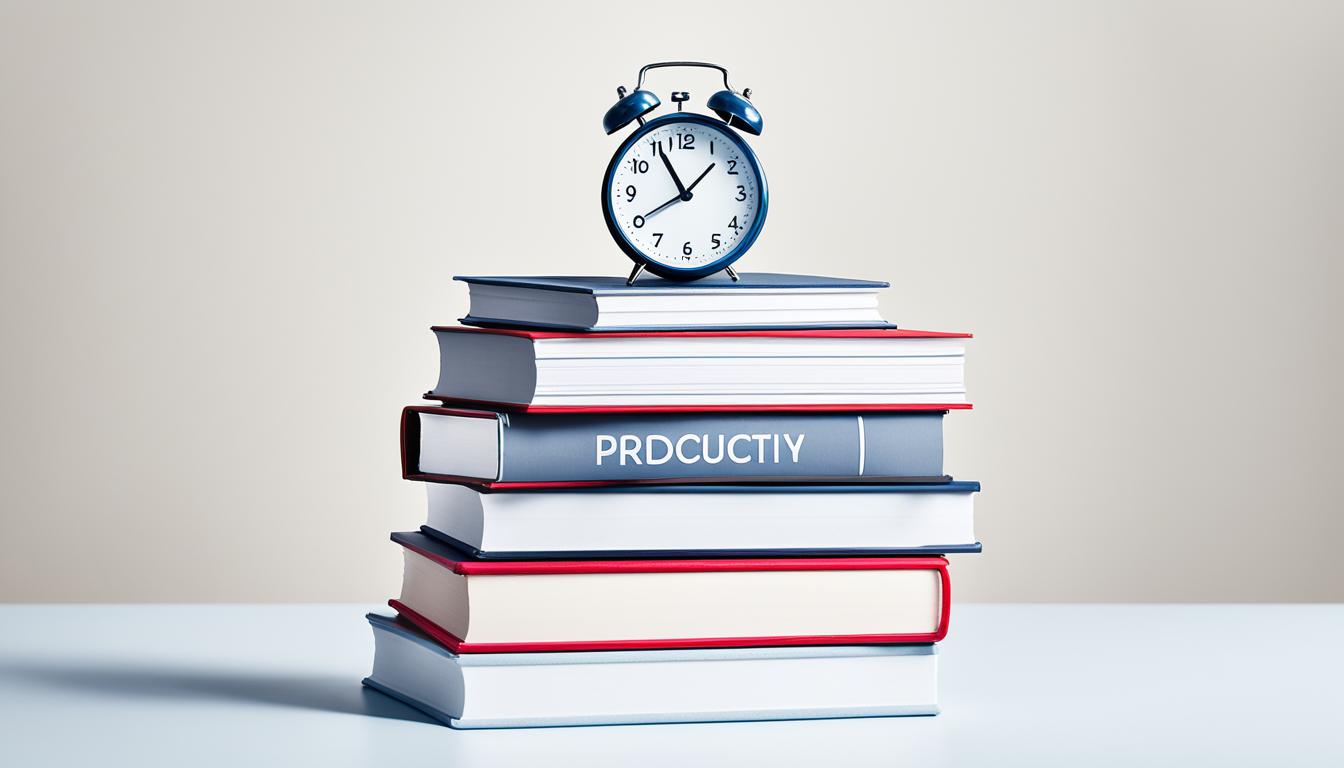
Are you constantly struggling to stay focused and make the most of your time? Do you find yourself overwhelmed with tasks and unable to prioritize effectively? It’s time to unlock your full potential and achieve a new level of productivity. But where should you start?
In this article, we will explore a handpicked selection of the best books for productivity that are sure to transform the way you work and help you optimize your efficiency. These books have been recommended by experts and have garnered high ratings and popularity among readers seeking to enhance their productivity skills.
Whether you’re looking for time management techniques, strategies to eliminate distractions, or ways to set clear goals and prioritize tasks, these books cover a wide range of topics to cater to your specific needs.
So, are you ready to take your productivity to the next level? Let’s dive in and discover the secrets hidden within these must-read books!
Key Takeaways:
- Discover a curated list of highly recommended books for maximizing productivity
- Learn valuable tips, tricks, and tools to enhance your efficiency
- Find strategies to eliminate distractions and stay focused on your goals
- Gain insights into effective time management techniques
- Unlock the potential for greater success and work-life balance
The 7 Habits of Highly Effective People by Stephen Covey
“The 7 Habits of Highly Effective People” by Stephen Covey is a classic in the field of productivity. This book focuses on aligning your actions with your values and developing seven key habits to move from dependence to interdependence. Covey’s approach emphasizes character ethic and long-term behavior modification for maximum effectiveness in all areas of life. With over 25 million copies sold worldwide, this book is a must-read for anyone looking to transform their productivity mindset.
Stephen Covey’s book empowers you to take control of your life and achieve success by cultivating habits that drive efficiency and effectiveness. By adopting the 7 habits outlined in this book, you can develop a strong foundation for personal growth and professional success.
The 7 Habits of Highly Effective People:
- Be Proactive: Take initiative and responsibility for your own actions and outcomes.
- Begin with the End in Mind: Define your goals and aspirations to guide your actions and decisions.
- Put First Things First: Prioritize your time and energy on tasks that align with your values and long-term objectives.
- Think Win-Win: Seek mutually beneficial solutions and collaborations to create positive outcomes for all parties involved.
- Seek First to Understand, Then to Be Understood: Listen attentively and empathetically to others before expressing your opinions or perspectives.
- Synergize: Embrace diversity and leverage the strengths and perspectives of others to achieve collective success.
- Sharpen the Saw: Continually invest in self-improvement and renewal to maintain and enhance your effectiveness over time.
By internalizing these habits, you can transform your mindset and behaviors to achieve maximum effectiveness in all areas of your life. Whether it’s in your personal relationships, career, or personal growth journey, “The 7 Habits of Highly Effective People” offers valuable insights and practical strategies to optimize your productivity and lead a fulfilling life.
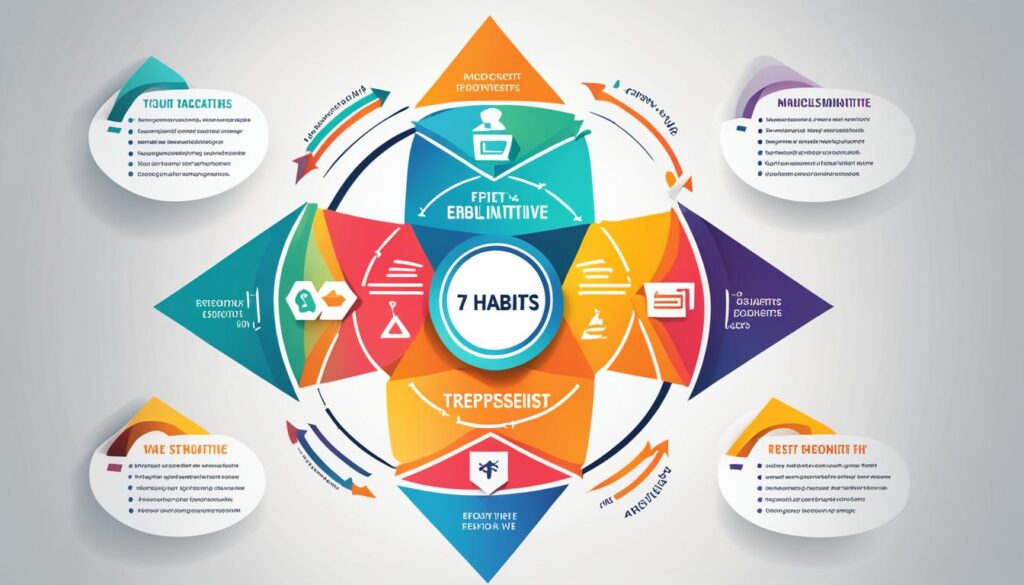
Stay tuned for the next section, where we will explore another highly recommended book for enhancing productivity and achieving success.
Deep Work: Rules for Focused Success in a Distracted World by Cal Newport
“Deep Work” by Cal Newport offers a compelling approach to combat the distractions of the modern world and achieve focused success. Newport shares strategies for eliminating clutter and noise, allowing you to immerse yourself in deep, productive work. By implementing the principles of deep work, you can overcome the constant distractions of technology and achieve a higher level of efficiency and success in your tasks.

In today’s fast-paced and hyperconnected world, it’s increasingly challenging to stay focused and accomplish meaningful work. The constant barrage of notifications, emails, and social media updates can easily divert our attention and prevent us from engaging in deep, concentrated work.
Deep Work provides a roadmap for eliminating distractions and creating an environment that fosters productive work. Cal Newport, a renowned computer science professor, argues that the ability to focus without interruption on cognitively demanding tasks is becoming increasingly valuable in our knowledge-driven economy.
To make the most of Deep Work, Newport suggests implementing several key strategies:
- Eliminate or minimize shallow work: Distractions such as social media, email, and unnecessary meetings can eat up valuable time and prevent deep work. Prioritize tasks that require deep concentration and delegate or eliminate shallow work.
- Establish routines and rituals: Create a structured schedule that allows for dedicated blocks of time for deep work. By consistently adhering to these routines and rituals, you condition your mind to enter a focused state more easily.
- Embrace boredom: In our always-connected world, we often seek constant stimulation and entertainment. However, Newport argues that embracing periods of boredom can lead to deeper thinking and enhanced creativity. Allow your mind time to wander and daydream, fostering new ideas and insights.
- Find the right balance: While deep work is essential, it’s also important to strike a balance between focused work and rest. Incorporate breaks and downtime to recharge your energy and maintain long-term productivity.
Through Deep Work, Cal Newport emphasizes the importance of creating an environment that enables deep focus and concentration. By eliminating distractions and devoting uninterrupted time to cognitively demanding tasks, you can achieve a higher level of performance and success in your work.
| Benefits of Deep Work | Examples of Distractions to Eliminate |
|---|---|
| Increased productivity and efficiency | Constant social media notifications |
| Enhanced creativity and problem-solving skills | Unnecessary meetings and interruptions |
| Improved focus and concentration | Excessive email checking |
| Higher quality work output | Procrastination and multitasking |
The Impact of Deep Work
By implementing the principles outlined in Deep Work, individuals and organizations can experience significant benefits. Deep work allows for more meaningful and impactful contributions, as it fosters deep thinking, creativity, and innovation.
Moreover, the ability to eliminate distractions and focus deeply on important tasks leads to increased productivity and efficiency. With fewer interruptions, individuals can complete their work in less time and achieve better outcomes.
Ultimately, embracing deep work can create a culture of focused success, where individuals and teams consistently accomplish their goals and produce high-quality work.
Getting Things Done: The Art of Stress-Free Productivity by David Allen
Are you constantly feeling overwhelmed by your workload and struggling to stay organized? Look no further than David Allen’s groundbreaking book, “Getting Things Done.” Through his comprehensive system, Allen offers practical strategies and techniques for achieving stress-free productivity in both your personal and professional life.
At the core of Allen’s methodology is the concept of clear goal-setting and effective organization. By carefully prioritizing your tasks and establishing a reliable system for capturing and processing information, you can regain control over your workflow and alleviate the burden of mental clutter.
“Your mind is for having ideas, not holding them.” – David Allen
The key to Allen’s approach lies in breaking down your responsibilities into manageable actions, which can then be implemented with ease. By utilizing his innovative workflow system, you can ensure that nothing slips through the cracks and that every task receives the attention it deserves.
Allen emphasizes the importance of establishing a trusted organizational system, consisting of specific lists and categories, where your commitments and responsibilities can be documented and regularly reviewed. This provides a sense of clarity, enabling you to make informed decisions about your priorities and take action accordingly.
By implementing the strategies outlined in “Getting Things Done,” you can overcome the stress and anxiety associated with a disorganized workflow. With a clear mind, focused priorities, and a structured approach, you will experience enhanced productivity and a greater sense of accomplishment in all areas of your life.
The Five Steps of Getting Things Done
- Capture: Collect and record all your tasks, ideas, and commitments into a reliable system.
- Clarify: Process the items you’ve captured and determine the necessary action steps.
- Organize: Place each action item in its appropriate context, category, or project list.
- Reflect: Regularly review and update your lists to ensure nothing falls through the cracks.
- Engage: Take immediate action on your identified tasks and priorities with a clear mind.
Implementing these five steps will help you achieve a state of flow, where you can navigate your tasks with ease and efficiency, without feeling overwhelmed or stressed.
Ready to take control of your productivity and create a stress-free work environment? Dive into the world of “Getting Things Done” and unlock the potential of a clear and organized mind.

| Pros | Cons |
|---|---|
| Provides a systematic approach to productivity | May require time and effort to fully implement |
| Offers practical strategies for organization and prioritization | May not resonate with those who prefer a more intuitive approach |
| Helps to alleviate stress and overwhelm | May not be suitable for individuals seeking quick fixes |
Essentialism: The Disciplined Pursuit of Less by Greg McKeown
“Essentialism” by Greg McKeown advocates for a disciplined approach to pursuing less and focusing on what is truly essential. McKeown challenges the notion that more is always better and provides practical techniques for discerning what truly matters in your personal and professional life. By eliminating the non-essential and prioritizing the most important tasks, you can make the highest possible contribution towards the things that truly matter to you.
In today’s fast-paced and overloaded world, it’s easy to get caught up in the cycle of “more is better.” We fill our lives and schedules with countless commitments, distractions, and obligations, believing that by doing more, we’ll achieve more. However, this approach often leads to burnout, overwhelm, and a lack of fulfillment.
Greg McKeown’s “Essentialism” challenges this conventional wisdom and offers a refreshing alternative. He proposes that by focusing on the few things that truly matter, we can make a significant impact and live a more meaningful life. Essentialism is about prioritizing our time, energy, and resources on the things that align with our values and have the highest possible contribution.
Through practical examples, thought-provoking anecdotes, and actionable strategies, McKeown guides readers on a journey towards a simpler, more purposeful existence. He emphasizes the importance of saying “no” to non-essential tasks, obligations, and commitments, in order to create space for the essential ones.
By adopting the principles of Essentialism, you can gain clarity, focus, and a sense of control over your life. Instead of spreading yourself thin and sacrificing quality, Essentialism encourages you to pursue depth, excellence, and true fulfillment. It’s about embracing the motto that “less is more,” focusing on what truly matters, and eliminating the excess noise and distractions that prevent us from reaching our full potential.
Whether you’re a busy professional, an overwhelmed parent, or anyone looking to simplify their life and make a meaningful impact, “Essentialism” is a must-read book that will inspire and empower you to prioritize your time and energy on what truly matters. So, take a step back, reevaluate your commitments, and embark on a journey of intentional living and profound effectiveness.
A Practical Guide for Essentialism
To help you get started on your path to Essentialism, here is a practical guide to implementing the principles from Greg McKeown’s book:
| Step | Action |
|---|---|
| 1 | Reflect on your core values and identify what truly matters to you. |
| 2 | Identify the non-essential tasks, commitments, and distractions in your life. |
| 3 | Say “no” to non-essential requests and obligations that don’t align with your values and goals. |
| 4 | Prioritize your time and energy on the few essential tasks that have the highest possible contribution. |
| 5 | Create boundaries and protect your time from distractions and interruptions. |
| 6 | Regularly review and reassess your commitments to ensure they align with your values and goals. |
| 7 | Focus on one task at a time and avoid multitasking. |
| 8 | Embrace the concept of “less is more” and let go of the fear of missing out. |
| 9 | Celebrate progress and milestones along your Essentialism journey. |
By following these steps and adopting an Essentialist mindset, you can create more space, time, and energy for the things that truly matter. Remember, the pursuit of less can lead to a more meaningful and impactful life. So, prioritize, focus, and make the highest possible contribution towards what truly counts.
Zen to Done by Leo Babauta
“Zen to Done” by Leo Babauta offers a simple and effective productivity system focused on habits and structure. This book provides insights on how to become more mindful and at peace with your to-do list, enabling you to execute tasks with clarity and focus. By simplifying your life and establishing productive habits, you can become more organized and efficient in your daily activities.
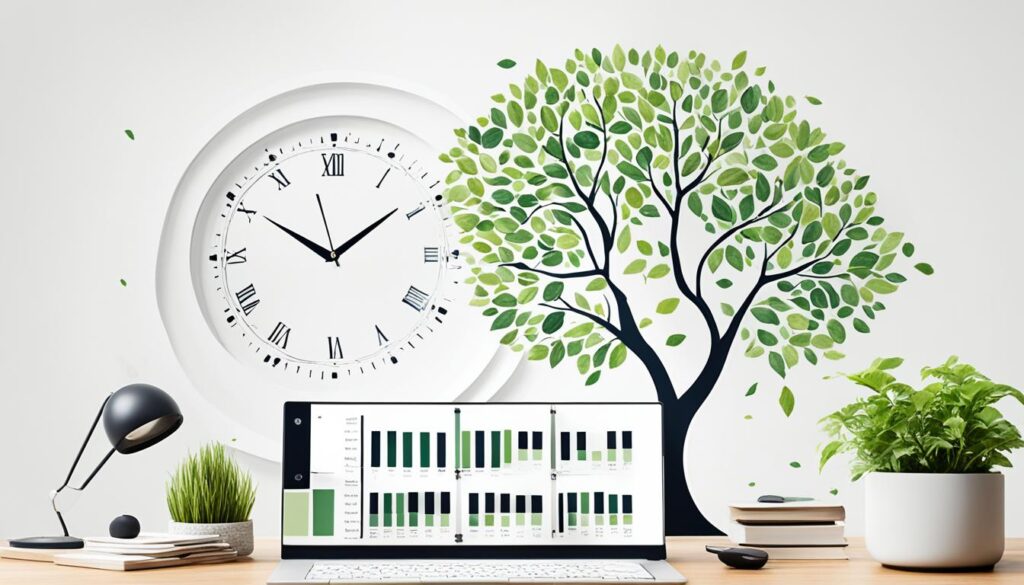
| Key Concepts in “Zen to Done” | Benefits |
|---|---|
| Simplicity | Reduces overwhelm and allows for better focus |
| Habits | Enables consistent and streamlined action |
| Organization | Enhances productivity and clarity |
| Execute tasks | Improves efficiency and effectiveness |
Free to Focus by Michael Hyatt
Are you tired of feeling overwhelmed by the never-ending to-do list? Do you often find yourself busy but not truly productive? It’s time to break free from the chaos and reclaim your focus. In his book “Free to Focus”, productivity expert Michael Hyatt shares powerful strategies to filter tasks, cut out nonessentials, and set boundaries for more productive workdays.
Hyatt’s approach revolves around the idea of intentional productivity – focusing on what truly matters and eliminating the distractions that pull you away from your goals. By implementing the strategies outlined in “Free to Focus,” you can gain clarity, direction, and ultimately achieve better work-life balance.
Filter Tasks and Cut Out Nonessentials
One of the key principles in “Free to Focus” is the importance of filtering tasks based on their value and impact. Hyatt guides you through the process of identifying your most essential tasks and eliminating the nonessentials that drain your time and energy. By narrowing your focus to the tasks that align with your goals and priorities, you can exponentially increase your productivity.
This filtering process goes beyond just saying “no” to certain tasks. Hyatt provides actionable strategies to delegate, automate, or eliminate tasks that don’t contribute to your overall success. By freeing yourself from nonessentials, you can create space for the work that truly moves the needle.
Setting Boundaries for Productive Workdays
In today’s hyperconnected world, it’s easy to be constantly pulled in multiple directions. But in order to truly focus and accomplish meaningful work, setting boundaries is essential. “Free to Focus” offers practical advice on how to establish clear boundaries in your work and personal life.
Hyatt teaches you how to guard your time, saying no to distractions and interruptions that hinder your productivity. By carving out dedicated blocks of time for deep, focused work, you can make significant progress without feeling constantly overwhelmed.
Additionally, “Free to Focus” helps you establish boundaries in your personal life, ensuring that work doesn’t encroach on your well-deserved downtime. By finding a healthy work-life balance, you can recharge and show up more fully in both your professional and personal spheres.
Table: Strategies from “Free to Focus” to Optimize Your Productive Workdays
| Strategy | Description |
|---|---|
| Task Filtering | Identifying and focusing on the most essential tasks that align with your goals, while cutting out nonessentials. |
| Time Blocking | Creating dedicated blocks of time for focused, uninterrupted work, guarding against distractions and interruptions. |
| Delegation and Automation | Offloading tasks to others or leveraging technology to streamline processes and free up your time. |
| Establishing Personal Boundaries | Setting clear boundaries to prevent work from encroaching on your personal life, allowing for rest and rejuvenation. |
By following the strategies presented in “Free to Focus,” you can transform your workdays into highly productive and impactful periods. The book provides a roadmap to help you escape the overwhelm, gain control over your time, and achieve your goals with greater efficiency.
Conclusion
In conclusion, the 10 recommended books on productivity offer valuable insights and strategies to optimize your efficiency in all aspects of your life. These books provide a unique approach to enhancing your productivity by aligning your actions with your values, eliminating distractions, and setting clear goals.
Whether you want to improve your work efficiency, overcome procrastination, or find balance in your daily routines, these books offer practical advice and techniques to help you elevate your productivity game. By implementing the principles and strategies from these books, you can optimize your efficiency and achieve greater success.
So why wait? Take a step towards improving your productivity today. Pick up one of these highly recommended books, embark on your journey towards greater efficiency, and unlock your full potential for success.

